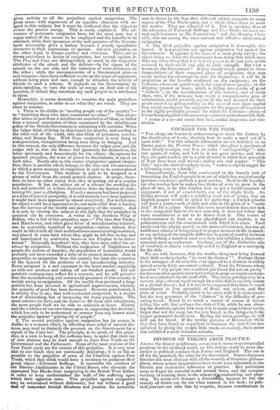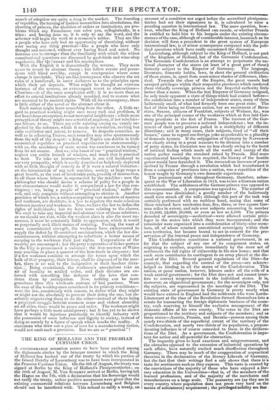DIVISION OF THEORY FROM PRACTICE.
AMONG the closest neighbours, occupying in many respects parallel positions in the civilized world, no two nations could be more dis- similar in political conduct than France and England. The one is all for the practical, the other fer the theoretical. France discusses theories the most abstract with all the warmth of inventive philoso- phers, whose ardent imaginations have never been submitted to the friction and obstructive influences of practice. Her politicians seem to forget the material world around them, and the complex working of existing facts, in the ardour oggysternatizing and plan- ning. No social evil dismays a French n, because he has the remedy all drawn out, for use when wanted, in his desk ; no poli- tical juncture can take him by surprise, because constitutions in
search of adoption are quite a drug in the market. The founding of republics, the turning of limited monarchies into absolutisms, the shooting of princes, the abolition of orders or institutions, are pro- blems which any Frenchman can solve you, syllogistically, in a trice ; and having done so, it is only to say the word, and the schemer will begin the work at a moment's notice. They are like a people who have only had an opportunity of theorizing, without ever seeing any thing practical—like a people who have only
thought and reasoned, without ever having lived and acted. No instance can be stronger than the familiarity with which the widest constitutional questions are discussed by gaol-birds and wine-shop -vagabonds, like QufmssEr and his accomplices. With the English it is diametrically the reverse. They seem never to revert to abstract theory ; but follow events and prece- dents with blind servility, except in emergencies where some change is inevitable. They are like journeymen who observe the set rules of a handicraft, in outer darkness as to the principles upon which their art depends. What might be thought an extreme instance of the reverse, an extravagant resort to abstractions- Chartism—is of the same complexion still : it is no more than an effort to extend institutions already moulded, and to restore what are assumed to be ancient rights. With all its extravagancy, there is little either of the novel or the abstract about it.
Each nation might learn something from the other. A little re- gard to practical working might save many rash and profitless, if not hazardous enterprises, to our mercurial neighbours : a little more perception of theory might save a world of nugatory, if not mischiev- ous labour, to us. There are evils existing among us, utterly ne- glected by the reformer, which it needs no revolution, nothing but calm conviction and intent, to remove. In despotic countries, as well as in scheming France, such remedies may arise spontaneously from the will of the despot : a King of Naples can dabble in little economical republics as practical experiments in statesmanship : with us, the machinery of state seems too cumbrous to be turned from its set course. And we, who boast of our "practical wisdom," neglect one entire branch of wisdom, and much that is practical to boot. To take an instance—there is one evil incidental to our very prosperity, which is coolly described or helplessly deplored with as little thought of remedy as if it were a natural visitation : on the introduction of any new machine, society at large reaps a great benefit, at the cost of intolerable pain, possibly of destruction, to all those whose labour is superseded by the machine : now the philosopher who should devise a scheme of polity for a people in our circumstances would make it comprehend a law for that con- tingency : we, being a people of "practical wisdom," suffer the evil, and only complain without attempting to obviate it. Another provision of which we, a nation comprising vast numbers of masters and workmen, are destitute, is a law to regulate the main relations between masters and workmen. True, we have the law to define the rights of individuals ; but we have none relating to the classes. We omit to take any impartial and abstract view of those relations ; or we should see that, while the weakest class is also the most nu- merous, it must be constantly liable to oppression, which it would as perpetually seek illicit means of resisting. Feeling the want of some concentrated strength, the workmen have endeavoured to supply the defect by ill-contrived combinations, which the law dis- countenances, without attempting to substitute a better means of securing to the workmen their just rights. Corporations of the wealthy are encouraged ; but the petty corporation of ticket-porters in the City is pronounced a nuisance : the iron-masters of Wales may combine to place a quarter of the iron-trade in abeyance ; but if a few workmen combine to arrange• the terms upon which the bulk of their property, their labour, shall be disposed of in the mar- ket, there is no end to the indignation at their insolent dicta- Being contraband, the workmen's associations take an air of hostility to settled order, and their dictates are en- forced with something like defiance of the laws that con- demn them by anticipation. Now, nothing can be more gratuitous than this wholesale nurture of bad passions. Were the case of the working-men considered in its primary conditions— were the law, consistently with reason, to define what they might or might not do, absolutely to prevent their doing the one, but ab- solutely empowering them to do the other—instead of there being a perpetual struggle betwixt common sense and violent absurdity on all sides, there would be peace and order. The workmen might have perhaps a little more social power; but it has yet to be shown that it would be injurious practically to identify industry with the possession of some influence and dignity in society, instead of doing so merely by a figure of speech which mocks the reality. A statesman who drew out a plan of laws for a manufacturing nation, would not omit such a provision. But we are so "practical"!



























 Previous page
Previous page